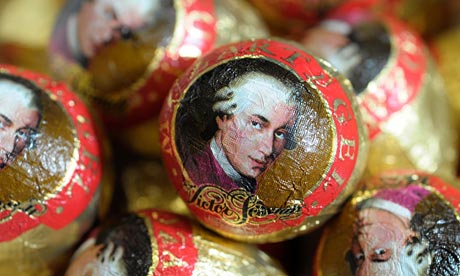
I've read a few things lately in which people have pondered the important matter of stew, and how to make sure it comes out of the oven tender, rather than chewy. In her new book Kitchenella, Rose Prince suggests that it needs to be braised on a lower temperature than most modern ovens allow – 75-80C, ideally – and urges cooks everywhere to follow the example of Jane Grigson, and let their pots "burp" rather than bubble. She also points out that most British meat is too young for the pot: fast and intensively grown livestock do not have fully developed connective tissue or bones and, being fed supplements to encourage muscle weight, are high in water content, which means that, paradoxically, they dry out during slow cooking. You need aged meat for a stew like your granny used to make.
Perhaps, though, we should also experiment with different cuts. On a recent trip to Vienna, I fell in love with tafelspitz, the boiled beef dish that was a favourite of the Emperor Franz Joseph I, and which requires, not shin or brisket, but a particular sirloin cut (Austrian butchers are most exacting, and have a different name for every muscle of beef). Of course, it's not failsafe. Cooked badly, it will be seriously unappetising: pasty and bland. I had tafelspitz at a well-known restaurant called Immervoll that tasted of nothing so much as the carrot-flavoured stock in which it had lain. But seal its edges first, and then cook it with precision, so that the centre of the meat is still blushed pink, and it will be tender, tasty and a perfect foil for the traditional accompaniments of horseradish cream and rosti potatoes.
I had not expected to like Austrian food (though I knew I would relish the collective appetite: Austrians like to add a second breakfast to their day, gabelfrühstück, and to enjoy a tea they call jause before dinner proper). I expected it to be heavy and boring. What's more – this is my own fault entirely – I had come to associate the country with a terrible queasiness. On my one and only previous visit, I had stayed at a completely batty spa (I have a friend who makes me laugh so much I am even willing to visit spas with her), where the regime decreed that I was allowed to eat only one boiled potato a day. Over the course of the next few days, I grew weaker and weaker, and hungrier and hungrier, until my friend – fearing, perhaps, that I was about to do my famous impression of Kathy Bates in Misery – took a taxi to the nearest town, where she bought a huge bag of Mozartkugel, those rather odd chocolate and marzipan balls named after the composer. When she got back, I ate 12 in about as many minutes and promptly felt as sick as a dog. Starvation followed by a Mozartkugel frenzy: this is not a diet I recommend.
Anyway, I was wrong. In Vienna, almost everything I ate was delicious. Not, I must admit, the wiener schnitzel, which were vast and knobbled, dry and burnt-looking, like the surface of some inhospitable planet. But the sausages, certainly (especially the Debrecener, which are lightly smoked and served uncompromisingly with mustard, sauerkraut and the marvellously-named Kaiser rolls), and the ubiquitous goulash soup, and the roe deer (it came with a rich sauce made from what I'm guessing were rowanberries). Also, the cakes (the retro pastel pink formica interiors of Cafe Aida make you regret all over again the cultural vandalism that has rid Britain of all its old caffs). Most of all, though, I liked tafelspitz. On a night so cold you felt your eyeballs might freeze, we went to a restaurant called Skopik & Lohn, in the Leopoldstadt. I'm sure the romance of our journey there helped: first, the rattling efficiency of the city's underground, all fluorescent lights and women huddling in furs; and then the looming, empty streets, which made me feel as if we were in an old war movie. There was a beautiful moment when, out of the gloom, an Orthodox Jewish man suddenly appeared, his hat casting a shadow in the streetlights as big and as proud as the prow of a cruise ship. And when we got to the restaurant, which was just how we wanted it to be, all white walls and wooden tables, everyone seemed to be wearing spectacles and black polo necks, and you couldn't help but fancy that they were all talking about Freud or Rilke or Stefan Zweig. I suppose you could say that the tafelspitz, intense, rosy and melting, spoke to the moment: welcome to the real Austria, it said, where some good things will never change.

